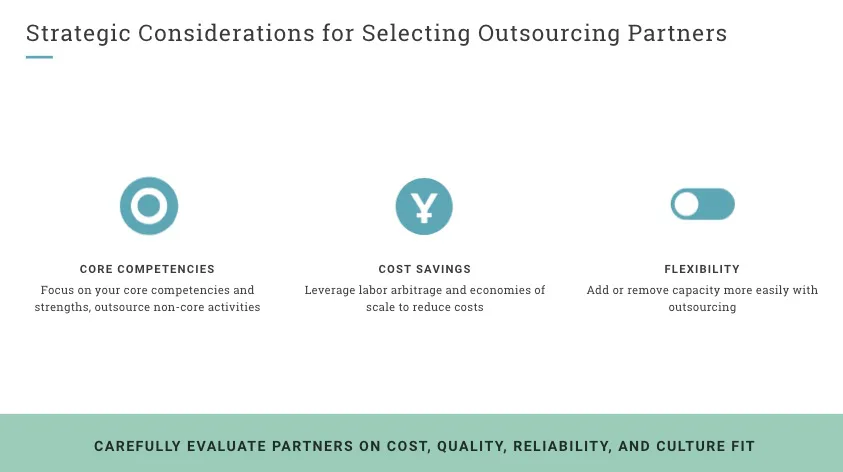Last Updated on June 9, 2024
In today's dynamic business landscape, companies are presented with a myriad of opportunities to outsource services to enhance their operational efficiency and overall performance. Outsourcing is not to be taken lightly, as it can significantly impact company success. In this comprehensive guide, we delve into the intricate process of how a company's process for how selecting outsourcing partners works. We offer insights and strategies to make informed decisions that drive business growth.

Understanding the Outsourcing Landscape
Outsourcing has become a cornerstone strategy for modern businesses aiming to streamline their operations, reduce costs, and access specialized expertise. From IT services to customer support, companies can choose from a global pool of outsourcing partners. However, selecting the right partner requires careful analysis and consideration.
Identifying Core Competencies
Before venturing into outsourcing, companies must clearly define its core competencies. These are the areas where the company excels and differentiates itself in the market. By identifying core competencies, a company gains insight into what areas are best kept in-house and which can be outsourced for optimal efficiency.
Evaluating Service Offerings
When selecting an outsourcing partner, the range of services they offer plays a pivotal role. A thorough evaluation of the potential partner's service offerings is essential to ensure alignment with the company's needs. This evaluation extends beyond a superficial review; it involves examining case studies, references, and even conducting pilot projects to gauge the partner's capabilities.
Assessing Cultural Compatibility
Cultural compatibility is often overlooked, but of paramount importance in outsourcing partnerships. A harmonious cultural fit between the company and its outsourcing partner fosters seamless communication, collaboration, and problem-solving. Ensuring that both entities share similar values and work ethics is critical for a successful long-term relationship.
Scalability and Flexibility
In a rapidly evolving business landscape, scalability and flexibility are imperative. Outsourcing partners should be equipped to adapt to changes in project scope, volume, and technological advancements. A partner with a track record of flexibility showcases its ability to align with the company's growth trajectory.
Quality Assurance and Security Measures
Quality and data security are non-negotiable aspects of outsourcing. A reputable partner should have stringent quality assurance processes in place, coupled with robust data security measures to safeguard sensitive information. This can include data encryption, regular security audits, and compliance with industry standards.
Cost Analysis and ROI
While cost savings are a primary driver for outsourcing, the decision should not be solely based on the initial price tag. A comprehensive cost analysis that considers both short-term expenses and long-term return on investment (ROI) is essential. A high initial investment in a quality partner can yield substantial savings and benefits in the long run.
Creating a Collaborative Ecosystem
Successful outsourcing partnerships are built on collaboration, transparency, and effective communication. Regular meetings, reporting mechanisms, and shared tools enhance the collaborative ecosystem between the company and its outsourcing partner. This synergy fosters innovation and problem-solving, driving mutual success.
Conclusion
Selecting outsourcing partners is a strategic endeavor that requires a comprehensive assessment of various factors. By understanding core competencies, evaluating services, assessing cultural compatibility, considering scalability, prioritizing quality and security, analyzing costs, and fostering collaboration, companies can make well-informed decisions that elevate their operational efficiency and drive business success in today's competitive landscape.
FAQs for Selecting Outsourcing Partners
1. What is outsourcing, and why do companies opt for it?
Outsourcing is the practice of contracting specific tasks, functions, or services to external parties, allowing companies to focus on their core competencies. Businesses choose outsourcing to access specialized expertise, reduce operational costs, and enhance efficiency.
2. How can a company determine its core competencies?
A company can identify its core competencies by assessing areas where it excels and differentiates itself from competitors. These strengths should align with the company's overall mission and strategic goals.
3. How do I ensure the cultural compatibility of an outsourcing partner?
To ensure cultural compatibility, engage in open discussions with potential partners about their work culture, values, and communication practices. Additionally, request references from other companies in your industry that have worked with the same partner.
4. What role does flexibility play in outsourcing partnerships?
Flexibility is crucial in adapting to changing market conditions. An outsourcing partner should demonstrate the ability to scale up or down as needed, accommodate new project requirements, and integrate emerging technologies seamlessly.
5. How do I measure the ROI of outsourcing services?
Measuring ROI involves considering both short-term cost savings and long-term benefits. Compare the initial investment with the quantifiable gains in efficiency, productivity, and revenue generation that result from the partnership.
About NovaLink
As a manufacturer in Mexico, NovaLink employs a unique approach that transcends the traditional model of shelter production. More than just the location of your manufacturing, we would like to become a partner in your manufacturing in Mexico. You will be able to relocate or initiate manufacturing for your company in Mexico in a low-cost labor environment with very little delay or up-front costs. Find out how we can help you by handling the manufacturing process.
There are NovaLink facilities in the border cities of Brownsville, Texas, Matamoros, Mexico, and Saltillo, Mexico.
Explore More: Discover Related Blog Posts
Expand your knowledge and delve deeper into outsourcing manufacturing in Mexico with our curated collection of related blog posts.
- Why Mexico Isn’t a Perfect Manufacturing Solution (and What That Really Means)
- Mexico Rewards Manufacturing Companies That Commit: Here’s Why
- Smart Moves: Strategies for Manufacturing in Mexico That Actually Work
- Bill of Lading Explained: Essential Guide to Types, Terms, and How It Impacts Your Manufacturing Operations in Mexico
- Americans Say They Want More U.S. Factory Jobs—So Why Don’t They Want to Work in Them?
- Top 10 Well-Known American Companies in Mexico—Should You Be Next?
- Offshoring and Outsourcing: Strategic Global Business Solutions
- 5 Essential Manufacturing Operations Strategies to Thrive Amid Uncertainty in 2025
- Shaping the Future: Innovations in Sustainable Manufacturing in Mexico
- Flexible, Responsive Production: How Mexico Enables Agile Manufacturing to Meet Dynamic Demand